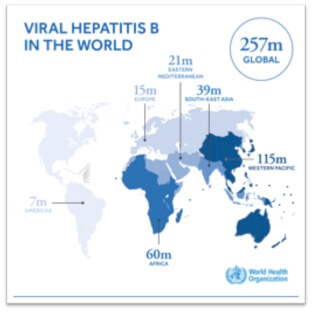Key facts about Hepatitis B
- Hepatitis B is a viral infection that attacks the liver and can cause both acute and chronic liver disease, including cancer.
- The virus is transmitted through contact with the blood or other body fluids of an infected person.
- About 2 billion people worldwide have been infected with the virus and about 370 million live with chronic infection and liver damage.
- Two thirds of those infected with HBV are unaware of their infection
- An estimated 800 000 people die each year due to HBV induced liver cancer or cirrhosis.
- Despite there being a vaccine, globally HBV kills one person every minute
- About 25% of adults who become chronically infected during childhood later die from liver cancer or cirrhosis (scarring of the liver) caused by the chronic infection.
- The hepatitis B virus is 50 to 100 times more infectious than HIV.
- Hepatitis B is preventable with a safe and effective vaccine.
What is Hepatitis B virus ?
Hepatitis B (HBV) is a potentially life-threatening liver infection caused by the hepatitis B virus. It is a major global health problem and the most serious type of viral hepatitis. It can cause chronic liver disease and puts people at high risk of death from cirrhosis of the liver and liver cancer.
Worldwide, an estimated two billion people have been infected with the HBV and about 250 million have chronic (long-term) liver infections.A vaccine to prevent catching HBV has been available since 1982. Hepatitis B vaccine is 95% effective in preventing HBV infection and its chronic consequences, and is the first vaccine against a major human cancer.
What are the symptoms of HBV ?
Hepatitis B virus can cause an acute illness with symptoms that last several weeks, including yellowing of the skin and eyes (jaundice), dark urine, extreme fatigue, nausea, vomiting and abdominal pain. Most of the time HBV infection is ASYMPTOMATIC.
Joint pains, muscle aches, rash, and jaundice (yellowing of the skin or eyes) may occur in some people. People can take several months to a year to recover from the symptoms. These people may not know that they are infected, and may therefore not go and see a doctor. People with chronic (long-term) hepatitis B infection may later develop serious problems like liver cancer and liver failure. These people may not know that they are infected, and may therefore not go and see a doctor. People with chronic (long-term) hepatitis B infection may later develop serious problems like liver cancer and liver failure.
Who is most at risk for chronic disease ?
The likelihood that an HBV infection will become chronic depends upon the age at which a person becomes infected, with young children who become infected with HBV being the most likely to develop chronic infections.
About 90% of infants infected during the first year of life develop chronic infections; 30% to 50% of children infected between one to four years of age develop chronic infections. About 25% of adults who become chronically infected during childhood die from HBV-related liver cancer or cirrhosis. About 90% of healthy adults who are infected with HBV will recover and be completely rid of the virus within six months.
Where is HBV most common ?
Hepatitis B is endemic in China and other parts of Asia. Most people in the region become infected with HBV during childhood.
In these regions, 8% to 10% of the adult population are chronically infected. Liver cancer caused by HBV is among the first three causes of death from cancer in men, and a major cause of cancer in women. High rates of chronic infections are also found in the Amazon and the southern parts of eastern and central Europe. In the Middle East and Indian sub-continent, an estimated 2% to 5% of the general population is chronically infected. Less than 1% of the population in western Europe and North American is chronically infected.

How can I catch HBV?
Hepatitis B virus is transmitted between people by contact with the blood or other body fluids (i.e. saliva, semen and vaginal fluid) of an infected person. In Africa the virus is mainly transmitted early in life, from mother-to-child or between children. HBV is spread through a break in the skin (e.g. cuts, needles, sores in the mouth), or through sexual intercourse. HBV is 50 to 100 times more infectious than HIV. Unlike HIV, HBV can survive outside the body for at least 7 days. During that time, the virus can still cause infection if it enters the body of a person who is not infected.
Unless vaccinated at the time of birth, these babies can become “chronic carriers,” which means they are infected with the virus for life. Of children who become infected with the virus between one and five years of age, 30-50 percent become carriers.
In many developed countries (e.g. those in western Europe and North America), patterns of transmission are different than those mentioned above. Today, the majority of infections in these countries are transmitted during young adulthood by sexual activity and injecting drug use. HBV is a major infectious occupational hazard of health workers.
HBV is not spread by contaminated food or water, and cannot be spread casually in the workplace.
The virus incubation period is 90 days on average, but can vary from about 30 to 180 days. HBV may be detected 30 to 60 days after infection and persist for widely variable periods of time.
How do I know if I have HBV?
A rapid point-of-care test after a finger prick or a simple blood test can tell if you are infected with the hepatitis B virus.
These tests can also help your doctor determine whether you are currently ill with hepatitis B, or if you are a chronic carrier. Although there is no treatment for the disease, bed rest and a good diet are important. Alcohol and medications (unless prescribed by your doctor) should be restricted. Follow-up blood tests are necessary to tell if the disease has gone.
What is HBV treatment ?
Not everyone infected with HBV will need treatment. Doctors usually only recommend treatment if the virus is damaging your liver.
Antivirals: These are oral medications (in pill form) that make it hard for HBV to reproduce, but they usually work for only as long as you take them. They are able to lower the amount of HBV in your body and stop liver damage in about 70% to 90% of patients. Unfortunately, these treatments cannot cure hepatitis B to date.
